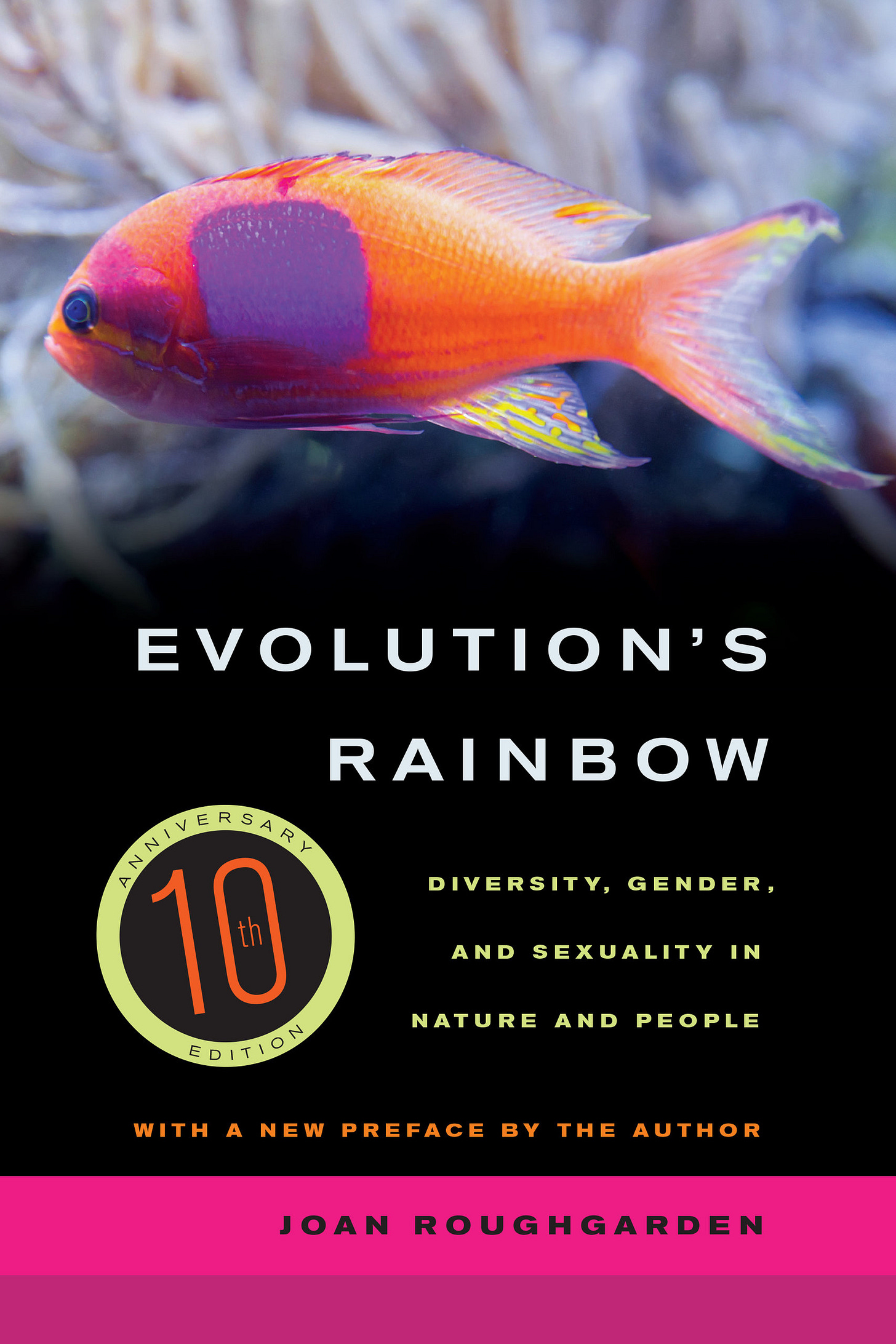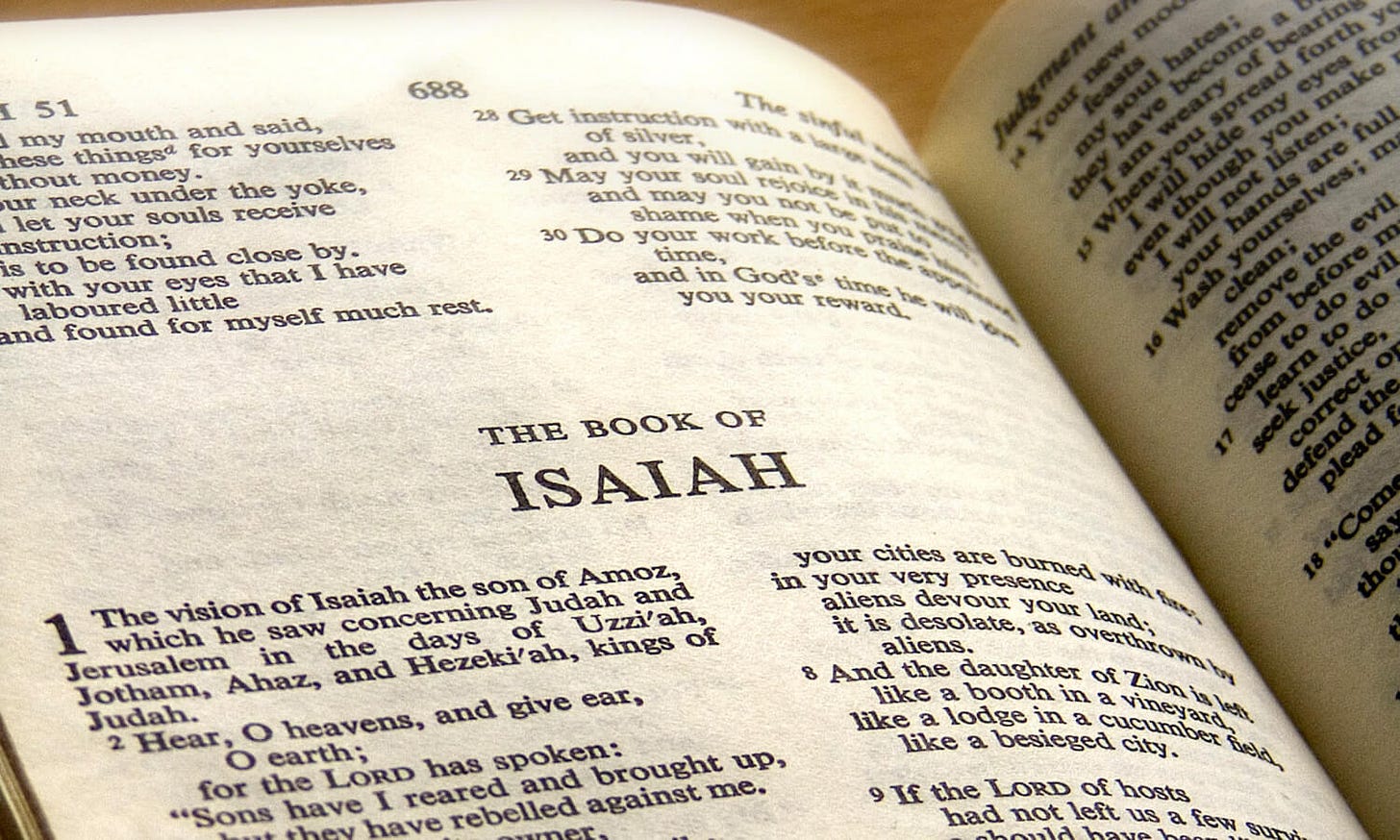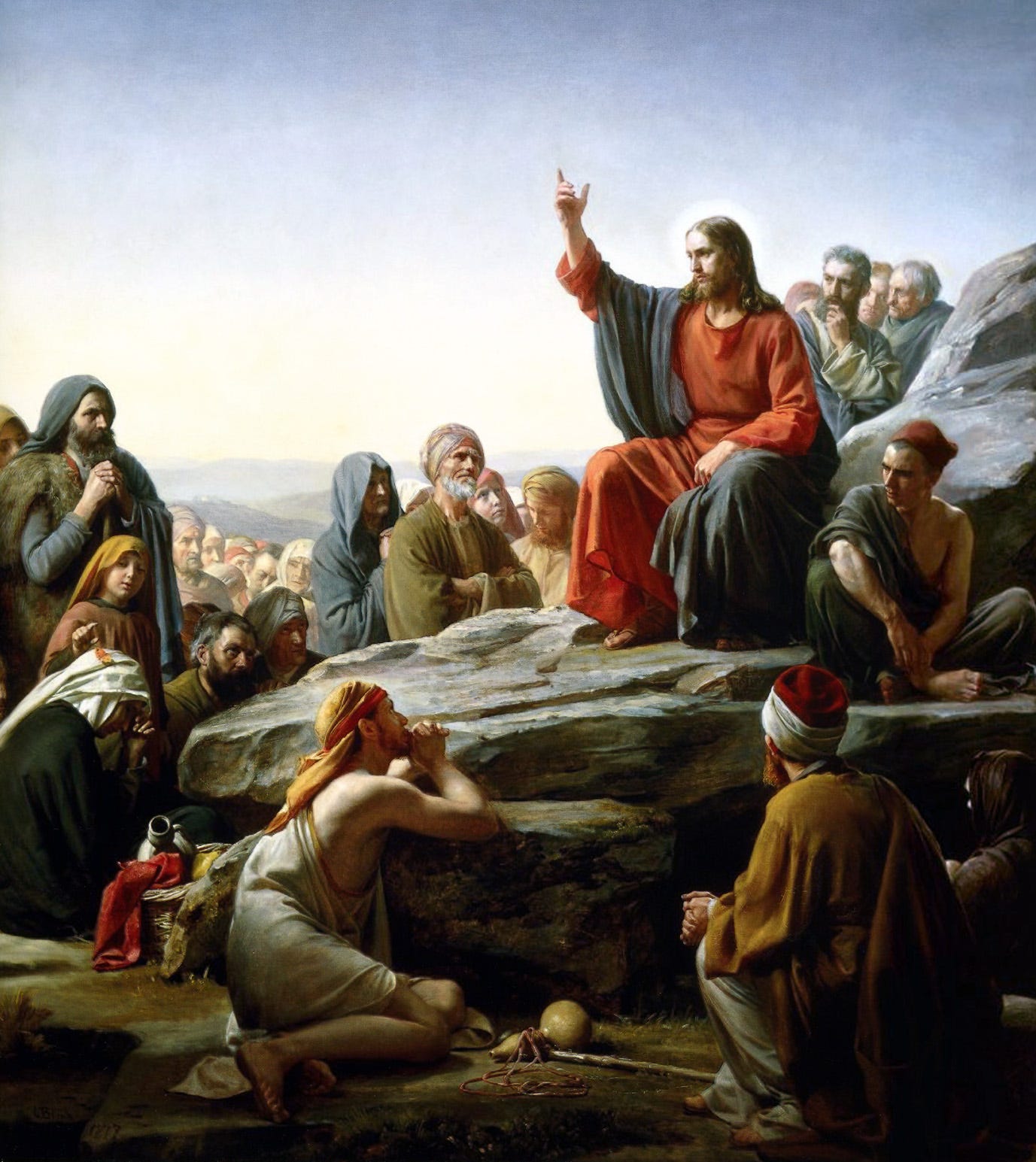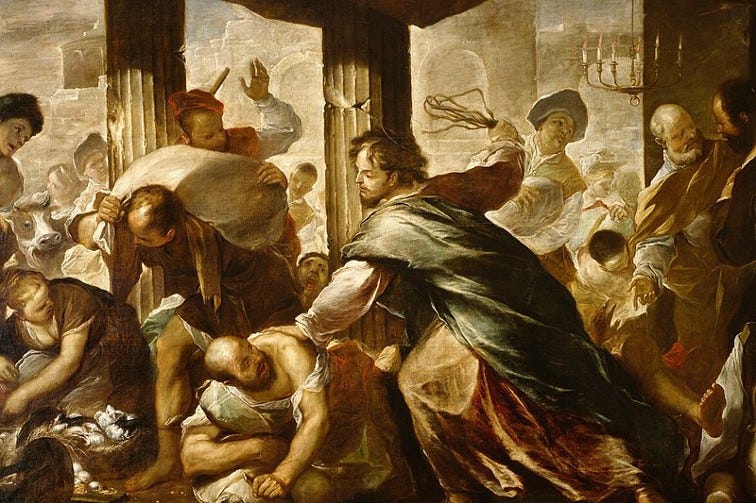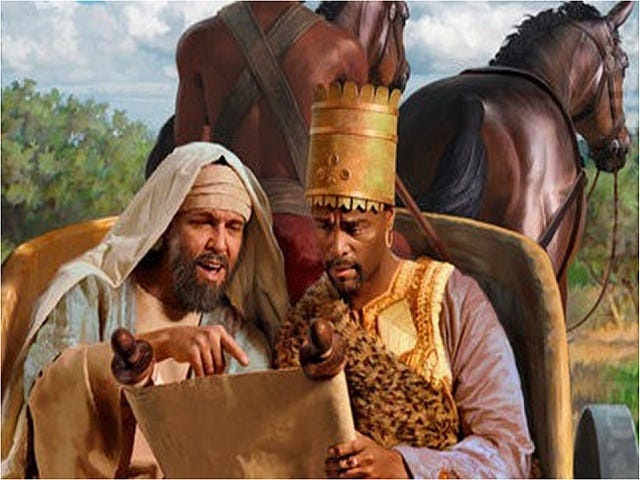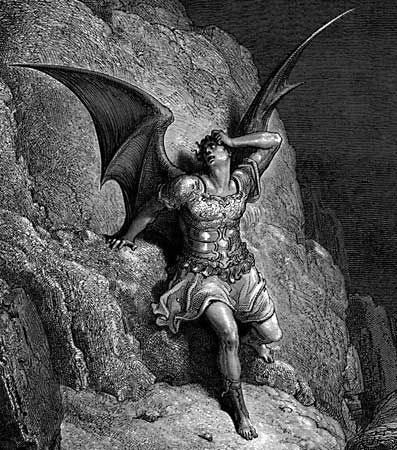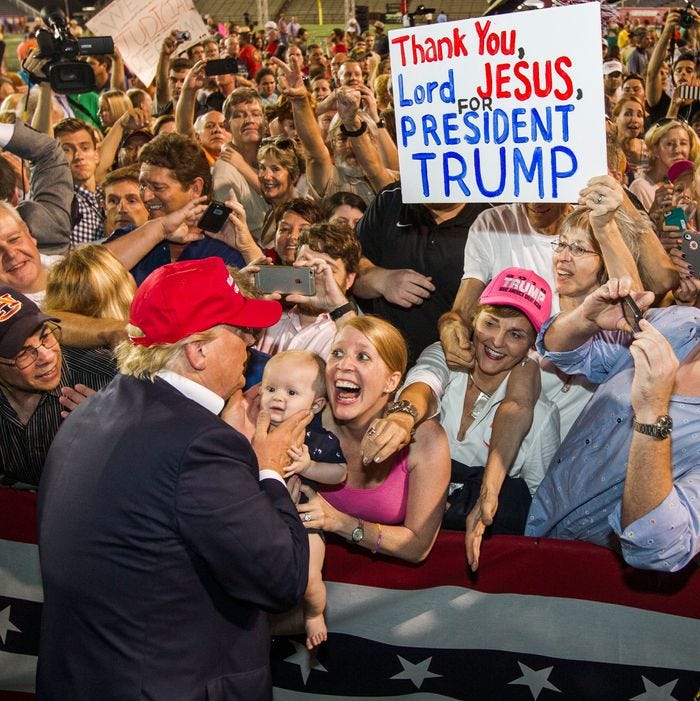Trans People in The Bible, or: How to Argue with a Fundamentalist
If you ever find yourself arguing with a transphobe who happens to identify as Christian, whether they got their ideas from the Right-wing Press, or from their church, try this counter-argument for size: The Bible does not condone transphobia; quite the opposite. “Well, No,” they might splutter, “Trans people didn’t exist, then, and The Bible is perfectly clear that God created Men & Women and there’s no mention of trans people, so God clearly didn’t intend people to change their gender…” except that, Yes, actually there are trans people and the Biblical view on us is mostly quite encouraging if not laudatory.
Christians tend to be oblivious to this because it’s not obvious that the occasional “eunuchs” who appear in The Bible are the closest equivalent to “people under the transgender umbrella” in the present day, and that ancient term has comparable breadth. (See Professor Joan Roughgarden’s excellent Evolution’s Rainbow: Diversity, Gender, and Sexuality in Nature and People (2003) or Evolution and Christian Faith (2006) for further evidence of the etymology, and a deeper analysis than is offered here.) The term does not automatically tell you whether or not the people in question had been castrated so as to be employed in royal harems or courts; some people called “eunuchs” in Biblical times (i.e. 6000BCE to the start of the common era) might simply have been asexual or gay (with or without castration) while others might have been castrated as victims of conquest (a practice referred to explicitly in one instance), but at least two references to eunuchs in The Bible are unambiguous about some eunuchs undergoing intentional, surgical transition, which may have taken place since the dawn of civilization (the gelding of animals being an almost universal practice), as would social transition (given the anthropological evidence of a “third sex” or some equivalent across countless societies).
Most appearances by our ancestors in the Old Testament involve no value judgement; we exist, we get up to all kinds of things, but we’re neither unclean nor ungodly. Given the long list of people and things that are unclean – including bats, badgers, lobsters, and squirrels – you can be fairly confident the Bible would tell us if we were. True, the prophet Isaiah implies that some people might think eunuchs are persona non grata (presumably because there’s so much emphasis on procreation in The Bible and being granted heirs is so often presented as a blessing, in book after book after book) but he also states that they’re wrong. Isaiah, by the way, isn’t one of the minor prophets; some have argued, he’s Christ’s favourite OT prophet, given the amount he alludes to him. This is what Isaiah has to say about us:
3 Let no foreigner who is bound to the Lord say, “The Lord will surely exclude me from his people.” And let no eunuch complain, “I am only a dry tree.”
4 For this is what the Lord says: “To the eunuchs who keep my Sabbaths, who choose what pleases me and hold fast to my covenant—
5 to them I will give within my temple and its walls a memorial and a name better than sons and daughters; I will give them an everlasting name that will endure forever. - Isaiah 56: 3-5 [1]
By comparing foreigners and eunuchs, Isaiah is making the point that, true, one automatically inherits ones status as one of the Chosen People, but conversion and intermarriage is possible and, if anything, it’s more admirable to accept the Lord voluntarily, hence the ‘…memorial and a name better than sons and daughters’ for eunuchs. Given how much the books of Genesis, Exodus, and so on, bang on about spawning, it seems that trans people get a pretty good deal…! (Consider: there’s an entire book called Deuteronomy, probably the dullest of the lot, which basically means the Book of Second Names; so, Yes, The Bible might feel cis-centric but when it says that we belong ‘within my temple’ and deserve ‘better’ than others, it’s highly significant.)
Skipping forward to the New Testament, in the Gospel of Matthew, Chapter 19, Verse 12, Christ echoes Isaiah during the Sermon on the Mount (much quoted and often regarded as the distilled essence of His teaching) when he uses eunuchs as part of an analogy to make a general point about the sanctity of marriage but also (like Isaiah) contradicts what are implied to be common misconceptions or prejudices about eunuchs themselves:
For there are eunuchs who were born that way, and there are eunuchs who have been made eunuchs by others—and there are those who choose to live like eunuchs for the sake of the kingdom of heaven. The one who can accept this should accept it. - Matthew 19:12
Note how the verse starts by asserting the normality of being a eunuch (whether gay, trans, or both), which could easily be cited to refute the notion that LGBT people are opposed to the values of God & His Son, before asserting that ‘liv[ing] like eunuchs’, i.e. being celibate, can be integral to ones attainment of the ‘kingdom of heaven.’ This, by the way, is Christ’s much-used expression for something closer to enlightenment, which is implied to be far better than, say, “piety” or “correct observance of the law”, or “obedience to the Pharisees & Sadducees” whom he frequently challenged.
Incidentally, rabbis were generally expected to marry so Christ is not alluding to celibacy as an absolute precondition of holiness, as in the Catholic church, centuries later, and in various monastic orders, but simply a matter of personal choice that happens to help some individuals on their personal, spiritual journeys. Despite present-day Fundamentalists’ attempts to dominate the conversation about what Christianity is, and impose narrow definitions, that’s quite a lot of “moral variance” right there. Note also that Christ likens being a eunuch to being Voluntarily Celibate, unlike every present day transphobe convinced that trans women are sexual predators, despite what a lot of the same cis people probably know: that oestrogen tends to reduce the libido, even if we weren’t already decent people whose crime stats are generally much lower.
(JC overturning the money-changers’ tables in the temple. A complex fellow.)
Incidentally, the passage about eunuchs appears immediately before the more famous and much quoted passage “Let the little children come to me, and do not hinder them, for the kingdom of heaven belongs to such as these” (Matt. 19:14). If you’re arguing with a transphobe who’s heard of that one (also translated ‘“suffer the little children to come unto me…”’) but unaware of the passage about those who were ‘…born that way’ (now, of course, a classic LGBT slogan and Lady Gaga album title, almost) you might politely suggest that they need to read a little more carefully. We can’t always pronounce that something is definitively more important because of the sequence – i.e. one teaching more important than another because it comes first – but since the Four Gospels were written over a long period, and selected from numerous competing accounts for inclusion, you have to assume some intentionality, and that our appearance survived a lot of opportunities for omission.
The final appearance of eunuchs in The Bible is in the Acts of the Apostles, where various disciples and early converts spread the Good News through the lands around the Mediterranean and Near East, emulating Christ in Occupied Judaea. Like all the books of the Old & New Testaments, they’ve been compiled from a huge range of writings (well over 20 alternative gospels survive) that more or less reinforce each other’s messages, refine them, fill in the gaps, or express ideas in slightly different ways that may be more resonant for different readers. The Book of Acts therefore includes examples of the kinds of people to whom Jesus might have preached, hung out with (like tax-collectors, assassins, the formerly possessed, publicans, and prostitutes), and welcomed into the Church if he’d had more time before being crucified, illustrating that there’s no limit to who can be saved but also who should be, if they happen to be recognized as being marginalized after his time. This is a crucial point: Christ preached about some people, and his disciples preached to many more, implying a potentially limitless series across human history; since he mentioned trans people, and his disciples preached directly to us, you can bet He would have preached to NBs and anyone genderqueer given half a chance. So, Yes, there aren’t many eunuchs in The Bible, but we’re obviously important enough to stress that we do belong, as in Acts 8: 30-40.
30 Then Philip ran up to the chariot and heard the man reading Isaiah the prophet. “Do you understand what you are reading?” Philip asked.
31 “How can I,” he said, “unless someone explains it to me?” So he invited Philip to come up and sit with him.
32 This is the passage of Scripture the eunuch was reading:
“He was led like a sheep to the slaughter, and as a lamb before its shearer is silent, so he did not open his mouth.
33 In his humiliation he was deprived of justice. Who can speak of his descendants? For his life was taken from the earth.”
34 The eunuch asked Philip, “Tell me, please, who is the prophet talking about, himself or someone else?” 35 Then Philip began with that very passage of Scripture and told him the good news about Jesus.
36 As they traveled along the road, they came to some water and the eunuch said, “Look, here is water. What can stand in the way of my being baptized?” 37 38 And he gave orders to stop the chariot. Then both Philip and the eunuch went down into the water and Philip baptized him. 39 When they came up out of the water, the Spirit of the Lord suddenly took Philip away, and the eunuch did not see him again, but went on his way rejoicing.
Philip baptizes the eunuch with no hesitation, which should be a fairly unambiguous rebuttal to transphobes who claim to find justification for transphobia in The Bible. More than that, though, the baptism of the eunuch is implied to be a commentary on the passage from Isaiah. Since Christ is commonly believed to have died without literal descendants then he, too, is often interpreted, after the fact, to be like the eunuchs who attain greater glory because they worship the Lord in spite of the assumption that having children is one of the greatest blessings God can bestow, the clearest sign of Grace. (I’m not getting into the argument that he probably had a wife and at least one child; it’s likely but the intentional symbolism is what matters here.) Taking the three passages together: eunuchs are welcome in the Church; they’re not intrinsically bad, despite common prejudices; it’s even more impressive when they choose to live by God’s laws (because they might be assumed to be cursed); and they epitomize the kind of outsiders Christ & the Apostles came for. Nice.
(Note how much better dressed the eunuch is than the drab cis apostle on the left)
As I mentioned above, Christ preached to a lot of outcasts and outsiders. Can we infer that eunuchs were often sinners and the Church should only accept those who repent of their sinful ways? I don’t think so. It’s notable that in none of these instances have they done anything wrong; instead, the prophets seem to be clarifying that, while people might assume that the message of a patriarchal religion is largely irrelevant to them, it’s not. Consider one of the most famous parables of all: “The Good Samaritan”. Jesus chose a particularly despised group to make the point that even those who might resent their persecutors could behave decently and, in fact, better than most people of his own faith, such as the rich man and priest who pass by on the other side of the road. There is, however, no parable of the “Good Eunuch”. Our ancestors are included, I’d wager, because they might otherwise be ignored altogether: because we would have been amounted to 0.6% of the population then, as now.
On a tangent, I thought a lot about the Parable of the Good Samaritan in the months to either side of starting hormonal transition (in early-2022). Every day, dozens of trans people living in repressive regimes – or just ignorant, confused families – post questions online that are answered by dozens if not hundreds of strangers, regardless of faith, nationality, sexuality, age, and so on. Some just up-vote, heart, or type a few words of encouragement but others write lengthy messages detailing resources they can access to escape those situations, and all of them do so anonymously. Just thinking of this now makes my heart swell with emotion, because all of them are good Samaritans, and yet most of them will have experienced condemnation at some point in their lives – sometimes for many years – and much of it on the basis of misunderstood (or wholly fabricated) “religious authority”.
Now, you may find that those transphobes want to continue arguing even after you’ve cited Isaiah, Matthew, and Acts. They might protest that these are only three instances and it’s ambiguous who is being referred to. Okay, but consider how little is said about the Adversary AKA Satan, who makes just three appearances – three in a 1,600 page book! – all of them strictly allegorical, and then consider how disproportionately He figures in the rhetoric of fundamentalists, who seem to be awfully invested in the idea of moral absolutes, which misses the very nature of The Bible as a whole. [2] We’re talking about a massive tome comprising dozens of books written by multiple authors across hundreds of years, grouped (at its simplest) into an Old and a New Testament. Both are crucial but if the New were supposed to replace the Old, why keep it at all? Why, if not to make the point that times change, values change, and even the nature of “God” changes (since “God”, in the various books of the Old Testament, often reads like an extended metaphor for the capricious nature of the Universe or Life itself, which never guarantees that good people have good fortune, which means you need to be on your toes all the time).
At another level of complexity, the New Testament has four main views of a single figure which range from the comparatively realistic (Jesus as charismatic preacher and healer) to the wildly fantastical miracle worker whose life is embellished with details from the myths of neighbouring cultures by people writing 60 to 90 years after Jesus died. Working out what constitutes “God’s law” takes a lot of cross-referencing but, for the sake of ease, The Bible does have a few rules singled out as the most important, namely The Ten Commandments. The idea of there being only two sexes, and marriage being an institution that only applies to men and women, are not among those rules. Hell, “Thou shalt have no God before me”, numero uno, instructs us to worship a being who happens to be dual-gendered, unlike most of those other ‘strange gods’. [3] Trans people have a serious head-start fulfilling this particular commandment… and you have to wonder what those ‘strange gods’ might be like, who are stranger than us.
If trans people – and gay people – really were as abhorrent as fundamentalists make out, if only for some of the prophets, you’d expect it to be a great deal clearer. Yes, one passage in the Old Testament states that homosexuality is an abomination, but the OT is full of glaring contradictions and most of the central figures in each book, whether or not they’re called “prophets”, do not lead blameless lives; they’re deeply flawed, with notable exceptions like Job (almost certainly an allegorical figure), and even Moses was never permitted to see the Promised Land. Taken together, the foremost message of The Bible might be: you can’t ever have a perfect system; you have to keep your wits about you, read closely and actively, and assume that the world will keep on changing.
SO, WHY ARE (SOME) CHRISTIANS ATTACKING US NOW?
Unfortunately, too many powerful figures in the 21st century are determined to willfully misread The Bible. In a world of “postmodern values” and “cultural relativism”, they bleat, you need moral absolutes to sustain you… which is why it’s so bizarre they look to a multi-authored, multi-perspectival book that epitomizes polyphony and diversity. In fact, “cultural relativism”, as coined by anthropologist Franz Boas, is the principle that you can’t judge the values and practices of a culture until you’ve understood how they fully fit into its lifeways, historical era, and locale… but once you’re ready you not only can but should judge (as Boas clarified after the Holocaust). The motives of nominally Christian movements (or tacitly Christian political pressure groups) in the 21st century are too complex to fully unravel here, as Boas would have us do, but some trends emerge: the world is fast approaching catastrophic climate failure; wars, pandemics, and famines are increasing; even if you deny a human cause for climate change, it’s evident that emigration from tropical regions is increasing, many of whom are climate refugees. For those who acknowledge the danger of the “human world” ending (because let’s be honest, the natural world will probably bounce back if the human species dies out before we reach four degrees above the pre-industrial mean…), the hope is that The Rapture will save those brainwashed by the message of the mega-churches.
(Seeing this picture again just made me a little more trans.)
For those who are less concerned about that particular existential threat, fear of The Great Replacement is another likely driver for their own “Gender-Critical Beliefs” (which is a polite, quasi-academic way of saying “Anti-Trans”, just as “Pro-Life” sounds kinder than “Anti-Women”). In a nutshell: if the darker races (and/or non-Christians) seem to be out-breeding the lighter, then one of the newer reasons must be that Gender Ideology is grooming girls to believe they’re boys and vice versa, as well as promoting The Gay Lifestyle (you know the one: the one all Gays get up to, without exception), with the net result that there are fewer decent Christians (because the darker races breed a lot faster). The Great Replacement Theory’s been kicking around for several decades but the current culprit, in the minds of the mad, is a coalition of Jews & US Democrats. Yes, there may be a lot of Christians out there who are mostly good and kind but ignorant of the fact that being trans and/or gay is not and cannot be a choice; there are, however, quite a few for whom an insistence on cis-het-normativity disguises a deeper, more carefully hidden racism. (To be very clear: there is no such thing as “biological race”; we are all one species in that we can all interbreed and - shocker - mixed race people may have “hybrid vigour” making them more healthy, not less, than people from a narrow gene-pool who erroneously consider themselves “pure-blooded”.)
Of course, the motives of politicians for attacking Gender Ideology can be completely amoral, too; they might be personally funded by Christian movements, or have attended Christian-funded seminars, but if all they hear is “Asking the Left to define women, and claiming to protect women from predators, are excellent ways to make the Left look both stupid and callous,” that’s all they need to know. Don’t believe me? Below is an excerpt from a report by the Independent Expert on Sexual Orientation and Gender Identity appointed by that bunch of well-known woke-leftie-liberal conspiracy theorists… the United Nations:
Today, narratives of “gender ideology” are employed in State and diplomatic spheres, in print and social media, at religious settings and events of conservative secular groups. They aim to challenge the recognition of gender under international law or the protection of the rights of trans and gender-diverse persons. All appear to have common traits, including vigorous social media messaging, simple and catchy slogans, the ability to leverage resources from their followers based on campaigns opposing social rights, and flexibility and adaptability to local contexts. Anti-trans narratives resonate with conservative platforms and are increasingly used strategically to energize and galvanize political bases. They…normalize a false monolithic religious-cultural identity…entrenching a climate of fear…to achieve political, social and/or economic power. This strategy has already [been] employed in successful national election campaigns around the world. [4]
Which a lot of trans people already know even if it’s hard to articulate succinctly and calmly without sounding paranoid. Remember, trans people: it’s not paranoia if they really are out to get you, and have enormous resources at their disposal to attack us, encourage politicians to enact laws to prevent our transition, encourage hate-speech (up 56% in 2022) that, in turn, feeds into a 33% rise in hate-crime, or simply drag their heels on trans healthcare which is now so shockingly insufficient in the UK – with waiting times averaging 37 months – that it constitutes de facto genocide. But how much money are we talking, here?
The aggregate revenue of US-based organizations associated with the anti-gender movement from 2008 to 2017 was US$6.2 billion; and at least $1 billion was funnelled into countries across the globe. The report concluded that, globally, funding for the anti-gender movements at least triples the funding destined to projects and events that promote the human rights of LGBTI persons. [5]
Specifically, $700,000,000 of dark money may have been used to create a hostile environment in Europe over a ten year period. Bear in mind, much of this is Vatican-led, and the Church of England called for a ban on conversion therapy for L, G, B, and T people in 2017 [6] and figures as prominent as the former Archbishop of Canterbury, Rowan Williams, maintained that position in 2022 when Boris Johnson’s government made a last minute exemption from the ban for transgender people, [7] a move that might have had a lot to do with his recent marriage to a Catholic, making him the first (nominal) Catholic prime minister (I say “nominal” because, recall, he’s also the first to be charged with a crime while in office, and he was already a serial adulterer before Catholicism offered him an excuse for having nine – or is it 10? – children.) In 2022, five years after calling for a ban, the C of E was split on the issue with 2,500 ministers and pastoral staff insisting that conversion therapy (deemed ‘torture’ by those ‘tofu-eating wokerati’, the UN) is ‘kind and merciful’ so all that dark money is certainly having an impact. [8] At present, in 2023, the public is more inclined to oppose conversion therapy than to support it but we shouldn’t underestimate churchgoers as an important bloc of voters to be wooed by cynical politicians.
(While I didn’t take this picture I was only a few yards behind whoever did, at the Downing Street protest in 2022. The atmosphere was incredible and, in a word, almost spiritual: I’d never been surrounded by over 3,000 of my people and our allies.)
Looking beyond Christianity, it’s reassuring to find that most cultures throughout history have found a place for trans people, sometimes sacred, sometimes highly valued, and more often than not with no shame involved until the arrival of the late-mediaeval / early-modern version of Christianity, which denounced such practices in the course of justifying the oppression of colonized people. Given how much solace can be found in The Bible (even for a non-believer like dangerously dysphoric younger-me) it’s a shame that people exploring their gender, struggling with depression, and despairing that they’ll ever feel whole, are more likely to be repelled by the very idea of Christianity because of the prominent bigots abusing its sacred text, before they take the time to read that text, themselves. If they did, though, they’d find numerous examples of hypocritical priests and flawed prophets who are meant to be questioned, among whom are representations of people just like them, who have always been there, were never assumed to be sinners, and were always meant to be welcome.
ENDNOTES
[1] Isaiah 56:3-5. New International Version,
https://www.biblegateway.com/
[2] For an excellent elaboration on this point, by a Pulitzer-winning author who can rightly claim to be one of the few people on the planet versed in most of the languages in which the many books of The Bible were written, and hence sensitive to the nuances of the original phraseology that can be accidentally lost in translation – or deliberately distorted – see Jack Miles, God: A Biography (New York: Alfred A. Knopf, 1995). Trans issues aside, he’s fascinating on the nuance of words, such as all of those translated as “abortion”, which vary from inducing a miscarriage (potentially fatal for the mother) to selling your children into slavery; he’s able to point out some of the dark jokes that make Jesus sound like much more of a badass than a pushover; and he points out that what’s rendered as “sin” is so vague as to be meaningless (e.g. long hair on men isn’t sinful – cue: transphobia – it’s tacky; gambling isn’t sinful: it’s reckless; and so on).
[3] See: https://jewishstandard.timesofisrael.com/gods-dual-gendered-name/ &
here, for a brief summary of how the controversy played out in the UK in 2023: https://yougov.co.uk/topics/society/articles-reports/2023/02/10/john-humphrys-does-god-have-gender-and-conscience
[5] “Meet the Moment”, Global Philanthropy Project: https://globalphilanthropyproject. org/meet-the-moment/
[7]https://www.pinknews.co.uk/2022/02/20/bishop-dorchester-conversion-therapy-ban/
[8] https://www.pinknews.co.uk/2022/02/16/conversion-therapy-ban-letter-liz-truss/





